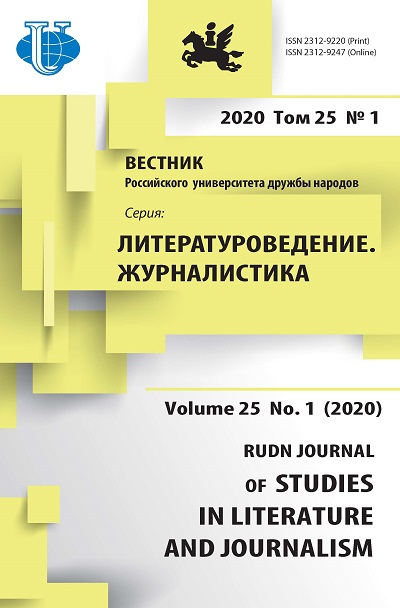Scientific topics in digital reality
- Authors: Yakubovich E.V.1
-
Affiliations:
- Academy of Media Industry
- Issue: Vol 25, No 1 (2020)
- Pages: 177-183
- Section: JOURNALISM
- URL: https://journals.rudn.ru/literary-criticism/article/view/23620
- DOI: https://doi.org/10.22363/2312-9220-2020-25-1-177-183
- ID: 23620
Cite item
Full Text
Abstract
The article presents the results of a study of more than two hundred scientific Internet resources, a significant part of which are the sites of scientific journals that have a printed version. The remaining resources are electronic industry and popular science publications, online information portals, community accounts in the blogosphere, social networks, and instant messengers. It is shown that these media products form a modern digital reality. The article presents the results of a study of more than two hundred scientific Internet resources, a significant part of which are the sites of scientific journals that have a printed version. The remaining resources are electronic industry and popular science publications, online information portals, community accounts in the blogosphere, social networks, and instant messengers. Based on the results obtained, it is shown that these media products in a special way form the modern digital reality, complicate and improve it. The creators and authors of scientific publications are journalists specializing in the field of popular science problems, scientists - representatives of the scientific community, as well as web users. The article raises the question of using a systematic approach (a complex of natural science, humanitarian and technological) when creating media resources of the scientific direction as the basis of informative-subject models of scientific and popular science media, complicating and qualitatively improving it. The creators and authors of scientific publications are also journalists specializing in the field of popular science problems, scientists - representatives of the scientific community, as well as web users, which reflects one of the modern trends in the development of media. The article raises the question of using a systematic approach (a complex of natural science, humanitarian and technological) in creating scientific media resources. This will be the basis of substantive-subject models of scientific and popular science media.
About the authors
Ekaterina V. Yakubovich
Academy of Media Industry
Author for correspondence.
Email: kate@sci.chem.msu.ru
Candidate of Chemical Sciences, Head of the Scientific Department of the Chemistry Department
105 Octobrskay St, bldg. 2, Moscow, 127521, Russian FederationReferences
- Shtepa, V.I. (2009). Estestvennonauchnaya tematika v otechestvennoj presse serediny XX – nachala XXI veka (na primere himicheskoj otrasli) [Natural science topics in the domestic press of the mid XX – early XXI century (on the example of the chemical industry)] (abstract of the dissertation of the Doctor of Philology). Voronezh.
- Gutnik, I.Yu. (2013). Estestvennonauchnyj, gumanitarnyj i biparadigmal'nyj podhody k pedagogicheskoj diagnostike [Natural, humanitarian and biparadigm approaches to pedagogical diagnostics]. Vestnik Yuzhno-Ural'skogo gosudarstvennogo gumanitarnopedagogicheskogo universiteta, (11), 130–139.
- Stepin, V.S. (2006). Filosofiya nauki: Obshchie problemy [Philosophy of Science: General Problems]. Moscow: Gardariki Publ.
- Nauka v Runete [Science in Runet]: Catalog. Retrieved from https://elementy.ru/catalog (accessed: 12.11. 2019).
- Sovremennaya enciklopediya [The Modern Encyclopedia]. Retrieved from https://terme.ru/ termin/gumanitarnyi.html (accessed: 12.11.2019).
- Slobodchikova, V.I., & Isaeva, E.I. (1995). Osnovy psihologicheskoj antropologii. Psihologiya cheloveka. Vvedenie v psihologiyu sub"ektivnosti [Fundamentals of psychological anthropology. Human psychology. Introduction to the Psychology of Subjectivity]. Moscow: Shkola-Press.
- Lazarevich, E.A. (1981). Populyarizaciya nauki v Rossii [Popularization of science in Russia]. Moscow: Izd-vo Mosk. un-ta.
- Budovskaya, Yu.V., & Volkova, I.I. (2012). Rasprostranenie mediakontenta v social'nyh media i social'nyh setyah: teoriya igr protiv viral'nosti [The distribution of media content in social media and social networks: the theory of games against virality]. Vestnik Moskovskogo gosudarstvennogo universiteta kul'tury i iskusstv, (5), 69–74.
- Urazova, S.L. (Ed.). (2019). Ekrannye kommunikacii kak faktor socializacii mediaprostranstva [Screen communications as a factor in the socialization of the media space]: Interuniversity collective monograph. Moscow: Akademiya mediaindustrii Publ.
Supplementary files















